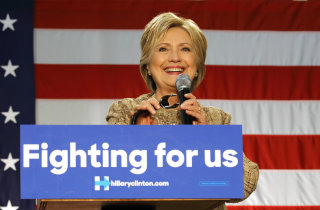 On Sunday, Wikileaks released yet another batch of emails hacked from the account of John Podesta, the chairman of Hillary Clinton’s presidential campaign. One email chain of particular interest in the new batch shows Clinton’s advisors debating whether or not to impose a new rule: should the campaign reject donations from “those lobbying on behalf of foreign governments,” so as to avoid the appearance of improprieties. It gets juicier than that, though: When the decision was finally made to accept the donations, nobody bothered to tell Clinton.
On Sunday, Wikileaks released yet another batch of emails hacked from the account of John Podesta, the chairman of Hillary Clinton’s presidential campaign. One email chain of particular interest in the new batch shows Clinton’s advisors debating whether or not to impose a new rule: should the campaign reject donations from “those lobbying on behalf of foreign governments,” so as to avoid the appearance of improprieties. It gets juicier than that, though: When the decision was finally made to accept the donations, nobody bothered to tell Clinton.
In the initial email, dated April 13, 2015, Dennis Cheng, Clinton’s National Finance Director, wrote:
We really need make a policy decision on this soon – whether we are allowing those lobbying on behalf of foreign governments to raise $ for the campaign. Or case by case.
Karuna Seshasai, whose official role in the campaign is unclear (she has an @hillaryclinton.com email address, has donated to the campaign, and Google searches suggest she’s a lawyer) replies suggesting a middle ground:
Want to add that these folks can also be divided into two categories – those who lobbied while HRC was at State and those who are currently registered.
Marc Elias, the campaign’s general counsel, also suggests his own alternative in the form of just weighing which foreign government is involved (FARA refers to the Foreign Agents Registration Act):
This is really a straight up political call. One middle option is to take case by case. If, for example, they are FARA registered for Canada, we may not case. If for N. Korea we would. But really comm’s call.
Elias elaborated on his idea in a subsequent reply:
Responding to all on this. I was not on the call this morning, but I lean away from a bright line rule here. It seems odd to say that someone who represents Alberta, Canada can’t give, but a lobbyist for Phillip Morris can. Just as we vet lobbyists case by case, I would do the same with FARA. While this may lead to a large number of FARA registrants being denied, it would not be a flat our ban. A total ban feels arbitrary and will engender the same eye-rolling and ill will that it did for Obama.
Campaign manager Robby Mook clearly felt that was untenable, chiming in with a one line reply:
Where do we draw the line though?
Mook subsequently found himself agreeing with Elias, though:
Marc made a convincing case to me this am that these sorts of restrictions don’t really get you anything…that Obama actually got judged MORE harshly as a result. He convinced me. So…in a complete U-turn, I’m ok just taking the money and dealing with any attacks. Are you guys ok with that?
That led to this gem from director of communications Jennifer Palmieri:
Take the money!!
…which echoes the sentiment expressed earlier by senior spokesman Jesse Ferguson:
Is there anyway to ballpark what percent of our donor base this would apply to (aka how much money we’re throwing away) Cost benefits are easier to analyze with the costs. 🙂
As far as what Wikileaks has, that specific email chain ended with Palmieri’s email, but another, from April 23, 2015, shows how it turned out. While these emails were actually released last week, we didn’t have the full context for them then.
After this whole discussion over the course of several days of emails and at least one conference call, nobody told Clinton what the decision was. That turned out to be a mistake, because it got reported anyway. From campaign chairwoman Huma Abedin to Mook (Podesta is ostensible CCed):
HRC read in paper that we are taking FARA money
We are going to discuss today in Elias meeting
talked to Elias
Flagging for you
Mook was slightly taken aback:
She doesn’t want to?
Abedin calmed him down:
she just didnt know that we had decided to accept it
wanted to know who the individuals are and wants to weigh in
karuna sending list for meeting
And that was that, at least as far as the emails show.
[Photo: Shutterstock]